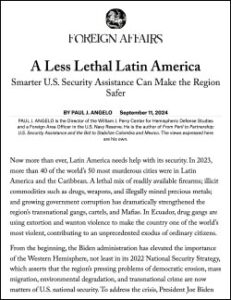Now more than ever, Latin America needs help with its security. In 2023, more than 40 of the world’s 50 most murderous cities were in Latin America and the Caribbean. Washington should again embrace the worldview that it can best protect its own security by helping democratic neighbors advance theirs. It can do so by drawing on the lessons of decades of U.S. security policy in the Americas but also by determining how those policies can be revised and improved. This article for Foreign Affairs explores the recent history of U.S. security assistance in Latin America and the Caribbean, highlighting the successes and failures in places such as El Salvador, Colombia, and Mexico. The article then addresses why such U.S. assistance continues to underdeliver, noting that the success of security assistance depends on leaders and organizations that the United States can sometimes influence but rarely control. Likewise, although the governments and security agencies on the receiving end provide convenient scapegoats when U.S. security assistance fails, Washington’s own bureaucracy shares the blame. To this end, the article concludes that Washington must remove its own bureaucratic barriers to strengthening security ties. Minimizing delivery timelines, committing to multiyear investments, and synchronizing priorities across U.S. government agencies would enhance the United States’ credibility as a reliable partner. The long history of U.S. security ties in the region provides a strong foundation for regional enthusiasm for U.S. initiatives. But whether such valuable programs can truly achieve results will depend on whether Washington can learn from past mistakes and overcome the bureaucratic and political limitations that have previously held it back.

